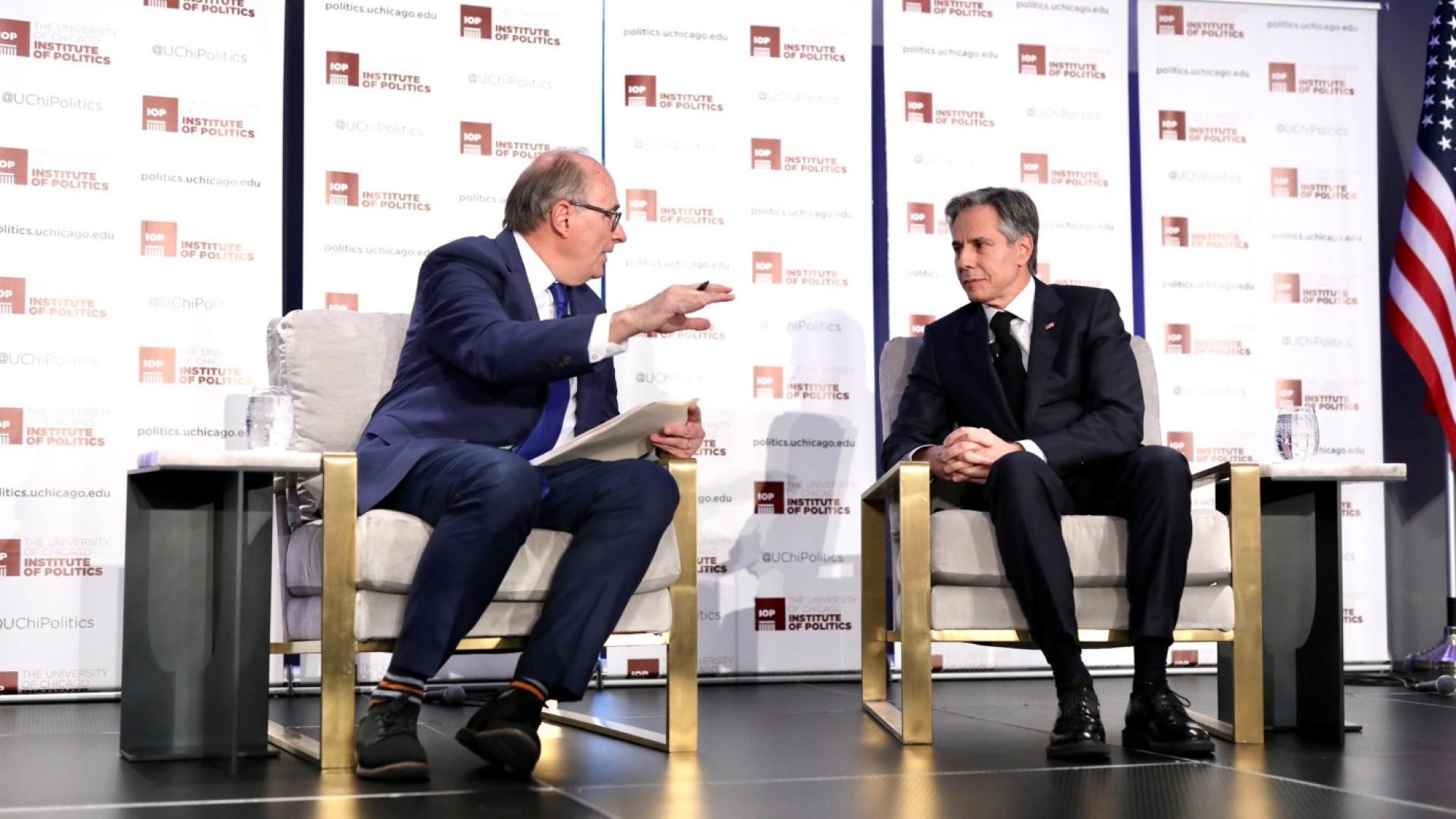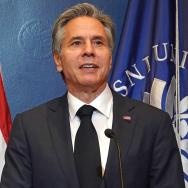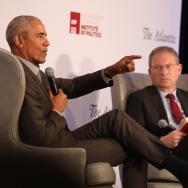At an event marking the 10-year anniversary of the University of Chicago’s Institute of Politics, founding Director David Axelrod noted that another anniversary also was taking place.
It’s been two years since President Joe Biden’s inauguration, and Axelrod asked his guest, Secretary of State Antony Blinken, what has been accomplished in that tumultuous time.
“Two years in, what it’s safe to say, from my perspective at least, is that we’re in a better place in the world than we were,” Blinken said at the event, held Jan. 20 at the David Rubenstein Forum. “The first instructions that I got from President Biden [when] taking the job were, ‘Get out there, re-energize, rejuvenate, re-engage our alliances or partnerships or working in international organizations.’”
The U.S. needs international partners to help address complex issues, including the COVID-19 pandemic, climate change and the fentanyl crisis, Blinken said. “We can’t deal effectively with a single one of these issues unless we’re actually finding ways to cooperate and coordinate and work with other countries,” Blinken said.
Turning attention to the war in Ukraine, Axelrod brought up a dispute over German tanks for the country and asked: “How much time do you have there before the coalition frays? Putin is obviously playing a waiting game, and the Russians have great tolerance for suffering, and he seems intent to try and wait this out.”
Blinken said that the international coalition support for Ukraine has “grown consistently stronger. … We’ve seen dozens of countries come together to try to make sure that Ukraine is getting what it needs when it needs it to defend itself, to push back against Russian aggression. … We’re up to almost $30 billion in military support, about $60 billion in total support. The Europeans have done much the same.”
He also said the Russian military has suffered horrific losses. “Meanwhile, the sanctions, the export controls that we’ve imposed on Russia are dramatically, dramatically undercutting its ability over time not only to continue the war, but to advance Russia’s economy, to allow it to pursue energy extraction. It’s going to have an increasingly profound and heavy effect on Russia going forward.”

Switching gears, Axelrod noted that there were a lot of students in the audience who care about human rights. Highlighting a quandary in the U.S. between “wanting to lead on human rights and the strategic imperatives” of the country, Axelrod asked: “How do you say we are the guarantors of human rights … but there are times when we can’t?”
Blinken said that it’s a delicate balance.
“President Biden wanted to make sure that one of the things we did was to put human rights back at the heart of our foreign policy, but it’s not and can’t be the totality of our foreign policy,” Blinken said. “I don’t see a zero-sum choice between values on the one hand and interests on the other.”
Blinken said that the U.S. has been working on its relationship with Saudi Arabia, for example, and engaging with the Saudis on the war in Yemen. “When we took office, [this] arguably was the worst humanitarian situation in the world, and the abuse of human rights of the people of Yemen was probably near the top of the list.”
As a result of the kind of engagement that the U.S. has pursued, he said, the conflict is certainly not over, but there has been improvement.
“President Biden wanted to make sure that one of the things we did was to put human rights back at the heart of our foreign policy, but it’s not and can’t be the totality of our foreign policy.”
During the question-and-answer period, a first-year College student who said he’s from Hong Kong asked Blinken about the situation there. Biden issued a deferred departure order for Hong Kong residents living in in the U.S., but that is expiring in a few weeks. “That means Hong Kongers living in the U.S. still live in uncertainty whether they have to go back to Hong Kong, to a city … [that is] not their home anymore and [risk] joining the ranks of more than 1,200 political prisoners,” the student said.
Blinken said: “I think the experience of Hong Kong in recent years has been one of the most sobering reality-makers for people around the world that we’ve seen, and what has happened in terms of the reversal of Hong Kong’s democracy through the actions … that Beijing has taken. What has happened in terms of, in effect, gutting the notion of ‘one country, two systems’ has had, I think, a profound effect not only for people in Hong Kong but beyond.”
He emphasized that the U.S. continues to look for ways to support those who are in “very difficult circumstances” as a result of the situation in Hong Kong.









